 |
Picks is a monthly sampling of Japan's art scene, offering commentary by a variety of reviewers about current or recent exhibitions at museums and galleries around the country.
Note: As of 1 October, Japan is no longer under a state of emergency. Most museums and galleries are open, but some may still require reservations or have other anti-Covid measures in place. If you are planning a visit, please check the venue's website beforehand. |
 |
 |
 |
1 December 2021 |
 |
| 1 | 2 | |
 |
|
 |
 |
|
|
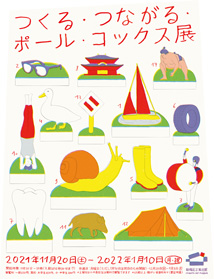 |
 |
 |
 |
| Create to Connect: Paul Cox Exhibition |
| 20 November 2021 - 10 January 2022 |
Itabashi Art Museum
(Tokyo) |
 |
|
Based in France but active globally, Paul Cox (b. 1959) has made his mark in painting, graphic design, and theatrical design among other genres. In Japan he has won fans through his advertisements and picture books. With bright colors and a light line that makes it feel friendly and intimate, his work is also intellectually playful and culturally edifying. This show introduces a recent series of landscapes, theater posters and other graphic design works, and of course his picture books.
|
|
|
 |
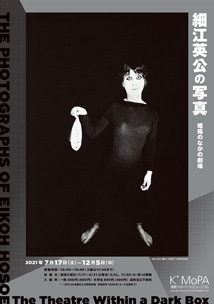 |
 |
 |
 |
| The Photographs of Eikoh Hosoe: The Theatre Within a Dark Box |
| 7 July - 5 December 2021 |
Kiyosato Museum of Photographic Arts
(Yamanashi) |
 |
|
A seminal figure in postwar Japanese photography who happens to be the director of this museum, Hosoe (b. 1933) enjoys global acclaim for the work he has produced over his long career. In the years after World War II, when realistic photography held sway, Hosoe instead prioritized the relationship between photographer and subject. Collaborating with contemporaries like the Butoh dancer Tatsumi Hijikata, he told stories of a world steeped in Eros and physicality. This retrospective offers viewers a look at original vintage prints of some of his most noteworthy images. (For a detailed review, see the November 2021 Here and There.)
|
|
|

|
 |
 |
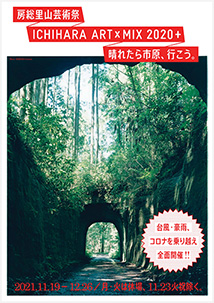 |
 |
 |
 |
| Ichihara Art x Mix 2020+ |
| 19 November - 26 December 2021 |
Venues along the Kominato Railway
(Chiba) |
 |
|
Delayed for a year by the pandemic, the "2020+" iteration of this delightfully bucolic art triennale in Ichihara, Chiba Prefecture, is finally underway at various locations -- shuttered schoolhouses, rural train stations, fields and forests -- along the Kominato Railway, which takes you on a leisurely ride through the rolling hills of the central Boso Peninsula. Artists from around the world participate. Visitors coming from Tokyo are advised to board the train at Goi, the line's northern terminus, and head south along the meandering Yoro River, disembarking wherever the urge strikes.
|
|
|
 |
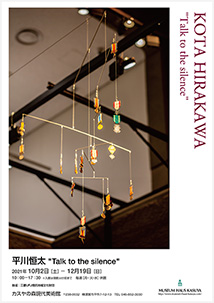 |
 |
 |
 |
| Kota Hirakawa: "Talk to the silence" |
| 2 October - 19 December 2021 |
Museum Haus Kasuya
(Kanagawa) |
 |
|
Inspired by the church-like architecture of the museum, contemporary artist Hirakawa has referenced the techniques and imagery of Christian art to produce new works on the theme "Keisho of Memory" (keisho being an ambiguous word that can variously mean inheritance, a warning bell, or an image, depending on the kanji characters used to write it). In this exhibition he presents works that constitute a conversation with historical events that are fading from our collective memory. His Trinitite series, for example, consists of Japanese war paintings reproduced entirely in black.
|
|
|
|
|
|
|
|

|
 |
 |
|
 |
 |
 |
 |
| Mai Yamashita + Naoto Kobayashi: A mirage. |
| 25 September - 19 December 2021 |
Kurobe City Art Museum
(Toyama) |
 |
|
The artist duo of Yamashita and Kobayashi are known for their use of multiple media, particularly video installations. Their work is rich with ideas sparked by a search for alternatives to conventional values, implemented by idiosyncratic methodologies that are neither economical nor efficient, but entail considerable labor. Through this m.o. they reexamine our relationships with the world and the structure of society. Utilizing the natural environment around the museum to contemplate the porous boundary between nature and humanity, this exhibition is full of hints for addressing the present moment, when ecological awareness and a willingness to coexist with others are more imperative than ever.
|
|

|
 |
 |
 |
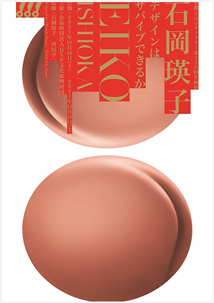 |
 |
 |
 |
| Survive: Eiko Ishioka |
| 16 October - 18 December 2021 |
kyoto ddd gallery
(Kyoto)
|
 |
|
To quote from the gallery: "Sparking a sensation in the advertising world of 1960s and '70s Tokyo through her work as art director [. . .], Eiko Ishioka (1938-2012) turned the existing image of women on its head and helped lay the groundwork for the growing women's empowerment of the 1980s. [. . .] The exhibition shines a light on her work in Japan before her move to New York in the 1980s and includes masterpieces of work for advertising campaigns run by companies such as Shiseido and Parco, as well as film and theater posters, record jackets, and book designs that include her own self-authored works."
|
|
|
 |
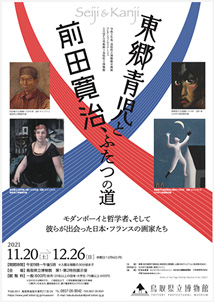 |
 |
 |
 |
| Seiji & Kanji: Two Ways |
| 20 November - 26 December 2021 |
Tottori Prefectural Museum
(Tottori) |
 |
|
Sampling from the collections of the host museum and the Sompo Museum of Art in Tokyo, this show introduces masterpieces by two Western-style painters, Seiji Togo (1897-1978) and Kanji Maeda (1896-1930). Though both artists were contemporaries born in provincial cities in western Japan, and both studied in Paris during the same period, they developed dramatically disparate styles. Supplementing their works here are those by other Japanese painters who studied in Paris -- Tsuguharu Foujita, Yuzo Saeki, Katsuzo Satomi -- as well as European masters who influenced them early on: Courbet, Renoir, Gauguin, Picasso.
|
|
|
|
|
|
|
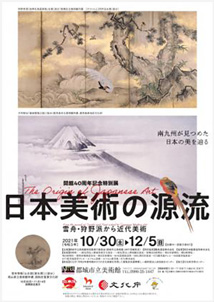 |
 |
 |
 |
| The Origin of Japanese Art |
| 30 October - 5 December 2021 |
Miyakonojo City Museum of Art
(Miyazaki) |
 |
|
Subtitled "From the Period of Sesshu and Kano School to Japanese Modern Art," this is a review of the last five-plus centuries of Japanese art from a southern-Kyushu perspective. Section 1, which showcases works by regional artists who followed in the footsteps of the Muromachi-era master Sesshu (1420-1506), immerses us in the world of medieval sumi-ink landscape paintings. Section 2 focuses on early-modern paintings by members of the Kano School, preeminent among Japan's art dynasties. Section 3 takes a look at modern artists from southern Kyushu whose work reflected the growing influence of Western art.
|
|
 |
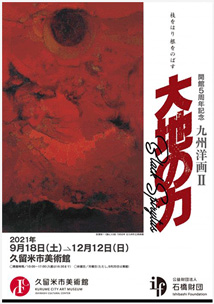 |
 |
 |
 |
| Kyushu-Yoga II: The Power of the Blackish Soil |
| 18 September - 12 December 2021 |
Kurume City Art Museum
(Fukuoka) |
 |
|
Painters from Kyushu like Seiki Kuroda (1866-1924) were at the vanguard of the Western-style art movement in Meiji-era (1868-1912) Japan. Their work often reveals the influences of their home island's landscapes and culture. Kuroda and other Kyushu artists were partial to browns and blacks as well as a gritty, soil-like texture that seems attributable to their roots in the rich, dark earth of the region. This show traces the genealogy of Western-style painting in Kyushu through works from the Meiji era to the present that exude the distinctively earthy energy of the area's artists.
|
|
|
|
|
 |
|